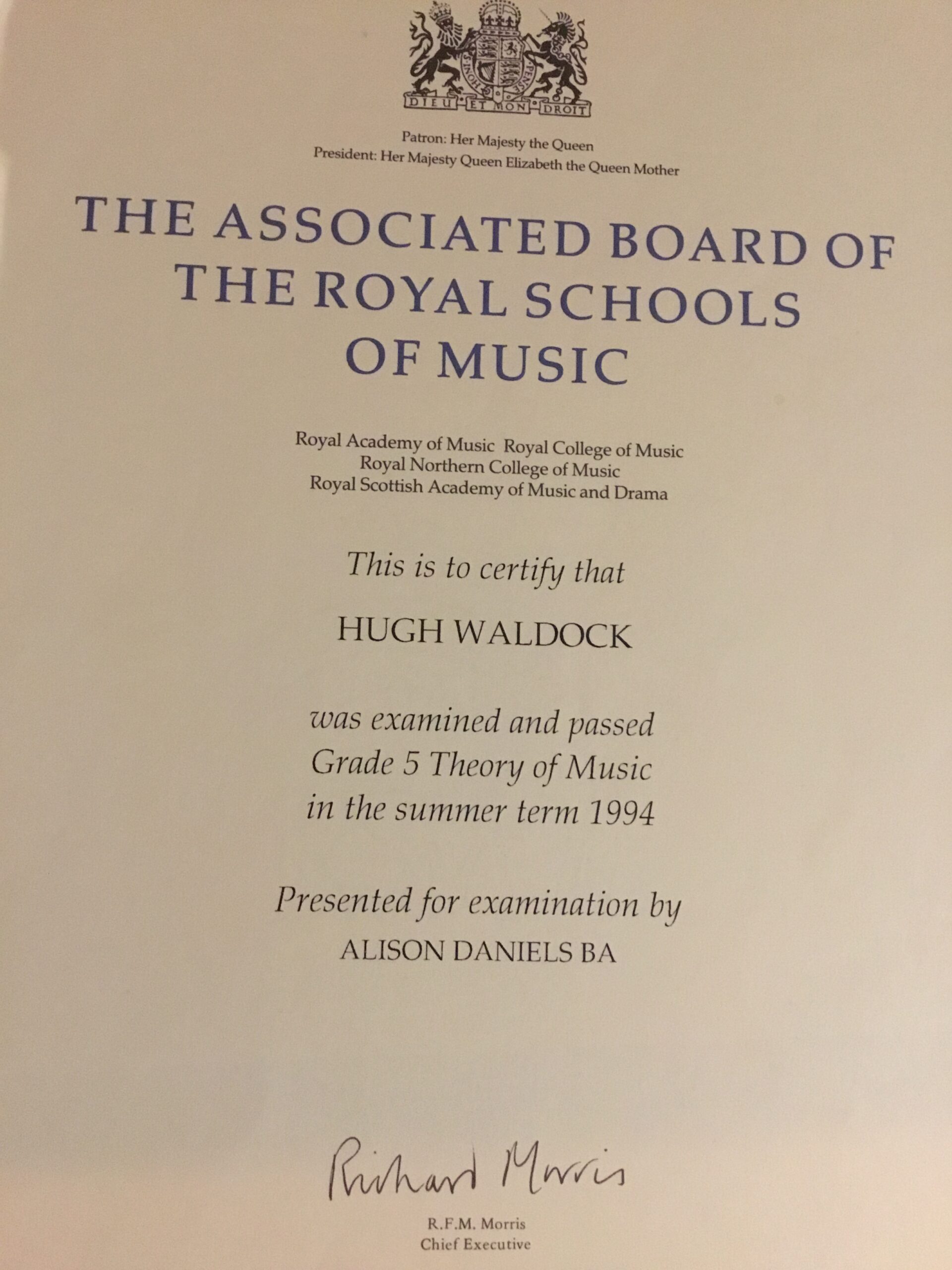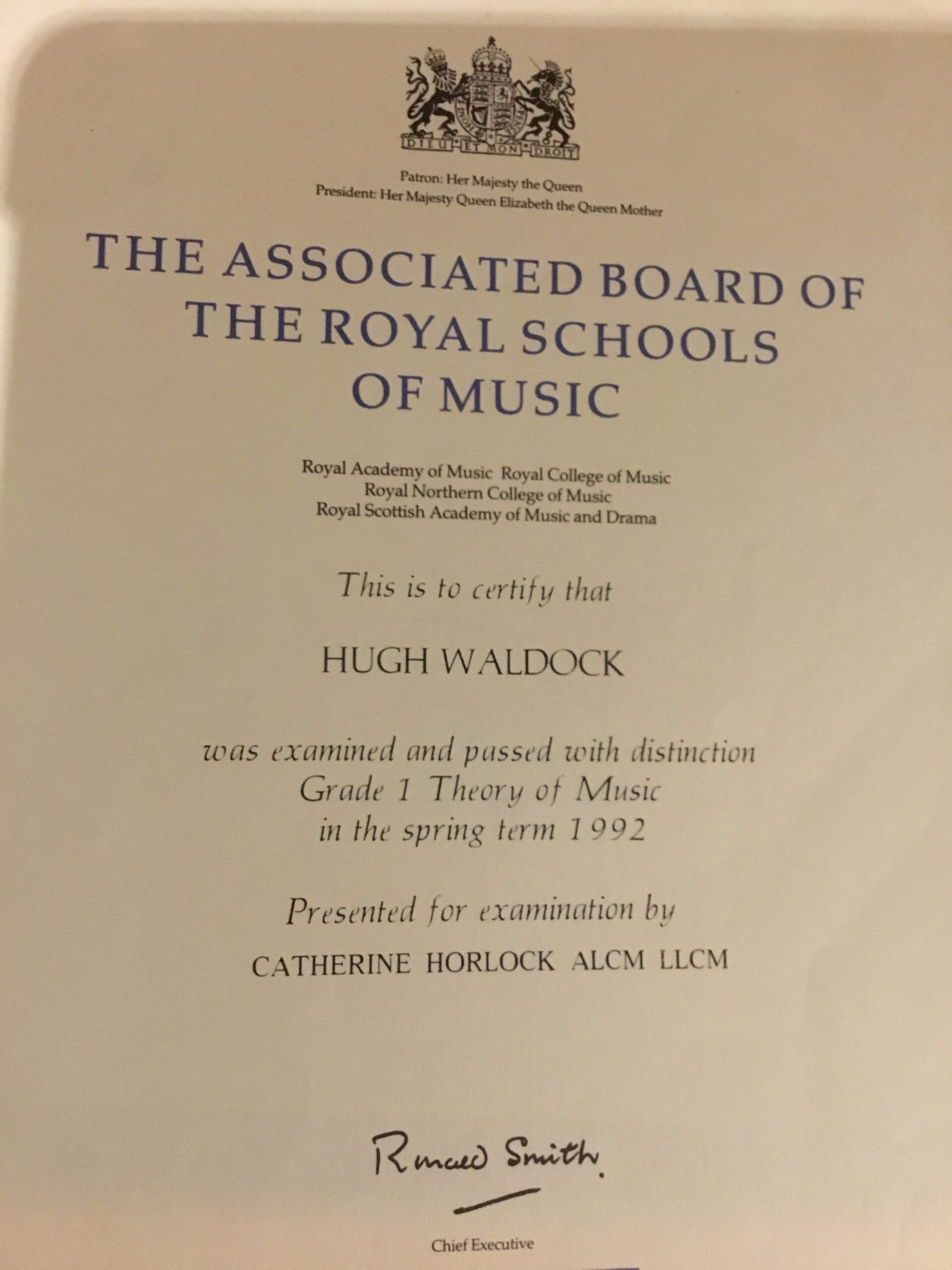ABRSM Stands for The Associated Board of the Royal Schools of Music (The Royal College and Academy Of Music's Exam board)
The ABRSM examinations service in Classical Music is the world standard in Classical Music School and College exams outside of the conservatoires themselves. They are British and have been going since the late 19th Century when the Royal College and Academy of Music started to rise to world prominence wrestling the initiative in Classical Music away from Germany (namely Leipzig and Berlin at the end of WWII).
RCM has been the most prominent Music Conservatoire in the world for eons now in the 1980s it was Juilliard in New York. RAM is close behind. The graded exam system is designed to build classical music knowledge enjoyment, skill and repertoire in Classical Music, and more recently musicals, pop and Jazz as well.
Whilst ABRSM exams do beat the drum for British music more than anything else they do have certain disadvantages as well. The standard is not in question if you get Grade 8 it's a real achievement or a diploma even more so what is in question to me is that it's not just that that made me a good musician. It's not an intellectual boot camp to me and pupils tend to think of pieces of music not as music but in terms of how AB would grade them as skill and prowess. I was once heavily criticised for playing it safe by a young student for playing a mere Grade 3 piece as he saw it in a final with some harder pieces. It was something I knew and liked as a piece of music. I think that leads to an ultra technical approach to playing and not a love of playing and singing at worst. I'm all for achieving the standards of Grade 8 and Diplomas but not with sacrificing the love of classical or any other form of music.
I strongly believe in being a prolific player and recorder of your own work reading from the score and learning pieces independently of tutors leads to more of a love of music and generation of idiosyncratic style. I feel playing 100 Grade 1 or 2 piece which are basically designed for our young ones first helps one tackle issues of style and interpretation much more readily and leads to a trule love of music beyond a mere technical capability. Just play 100 little pieces and THEN do Grades 1,2 and three as a conclusion and rubber stamping of your love and achievement in music. Don't ever just do the three or four pieces you need for the level and think you have achieved that standard of playing until you can sight read and record anything at that level of technical skill.
Big Tip and Rule of Thumb:
I made a mistake being like that when I was younger. My advice is just sing and play everything you can and that's what makes you love it. When I learned in Germany I learned pieces Bach wrote to teach his own kids and I never saw them in terms of what grade they were for the first time that helped me to love what I was doing. It's a wonderful system but no system is perfect.
Example of Playing from the Current Grade 4 Piano Syllabus
Dominico Cimerosa - Sonata in G I. Allegro Di Molto
Randell Hartsell - Sunsets in Savannah
The AB Graded Exam System
The AB exam system is now linked to the National Curriculum :
Pupils are awarded Grades Pass, Merit or Distinction
It's marked out of 150:
A distinction is 130 +
A merit is 120 +
A pass is 100 + points
Grades 1-3 are Junior Grades
Grades 4-5 is QCF Level 2 or GCSE
Grades 6-8 are QCF Level 3 or A Level
The ARSM Diploma is QCF Level 4 (90 CATS Points) or 1st Year Undergraduate
The GRSM is QCF Level 6 or Graduate level
The FRSM is QCF Masters Level performance at Level 7.
You must achieve a Grade 5 exam in Theory of Music to gain performance grades above Grade 5 on any instrument or voice.
You must achieve a practical Grade 8 to gain a performance diploma as a prequisite.
A prerequisite for a Teaching Diploma is now six months experience teaching your instrument and Grade 6 practical.
MY ABRSM Exams
Associate Diploma in of the Royal Schools of Music in Vocal Performance (ARSM)
After many ups and downs as a singer I'm finally doing my Associate Diploma which is 1st Year UG Conservatoire level classical singing.
This is My Final Programme
Robert Schumann In the Wonderful Month of May from A Poet's Love (Sung in German) Genre : Romantic Art Song
Robert Schumann As I look into your eyes form A Poet's Love (Sung in German) Genre : Romantic Art Song
John Dowland Come Away, Come Sweet Love. Genre : British Renaissance
Thomas Arne Now Pheobus Sinketh in the West from the Masque of Alfred Genre British : Pre-Classical
Alessandro Scarlatti Now the Sun from the Ganges... Genre : Early Neapolitan Baroque Opera (Sung in Italian)
Wolfgang Amadeus Mozart In these Hallowed Halls from The Magic Flute Genre : Classical Opera (Sung in German)
Robert Schumann On a Glowing Summer Morning from A Poet's Love (Sung in German) Genre : Romantic Art Song
Robert Schumann The Old and Angry Songs from A Poet's Love (Song in German) (Sung in German) Genre : Romantic Art Song
Franz Schubert Halt! from The Beautiful Miller's Wife (Sung in German) Genre : Romantic Art Song
Ideal Match Hugh Waldock Genre : 21st Century British Art Song.
If Music Be the Food of Love 2nd Setting by Henry Purcell Genre : English Baroque Song
You must sing 20 mins from the standard repertoire list they provide and up to 10 mins of your own choice music at around Grade 8 level. Up to 30 mins in total with no mistakes.
You must also sing in at least three modern living languages.
I chose the programme myself and have employed Dr Sasha Valeri Millwood as my private accompanist for the job. We are both members of the Independent Society of Musicians a governing body for professional Classical Music since 1882 in London and are official professional classical musicians by decree. I'm a student member and he's a full member. We will be recording the fruits of our labour as the final recital and uploading the video for marking to the exam board later in the year. We've been practising since March.
Video of us Practising in Brentwood for the performance
My Graded Exams
1. singing
I hold two graded exams in singing; the GCSE standard Grade 5 with Merit and the A Level Performance Major standard Grade 8. I was taught be Jane Bagnall at Ipswich School for Grade 5 and Patrick McCarthy AGSM for Grade 8. Here are the exam certificates and mark sheets.
For Grade five I sang a list of three standard repertoire songs :
1. Where'ere You Walk from the Opera Semele by Georg Friedrich Handel
2. Adam Lay YeBounden by Boris Orb
3. Five Eyes by Cecil Armstong Gibbs
Then one unaccompanied Folk Song called The Bird Song. I achieved it at school when I was 15 and really surprised my teaching by almost achieving a distinction grade I was just 2 marks short on my sight reading.
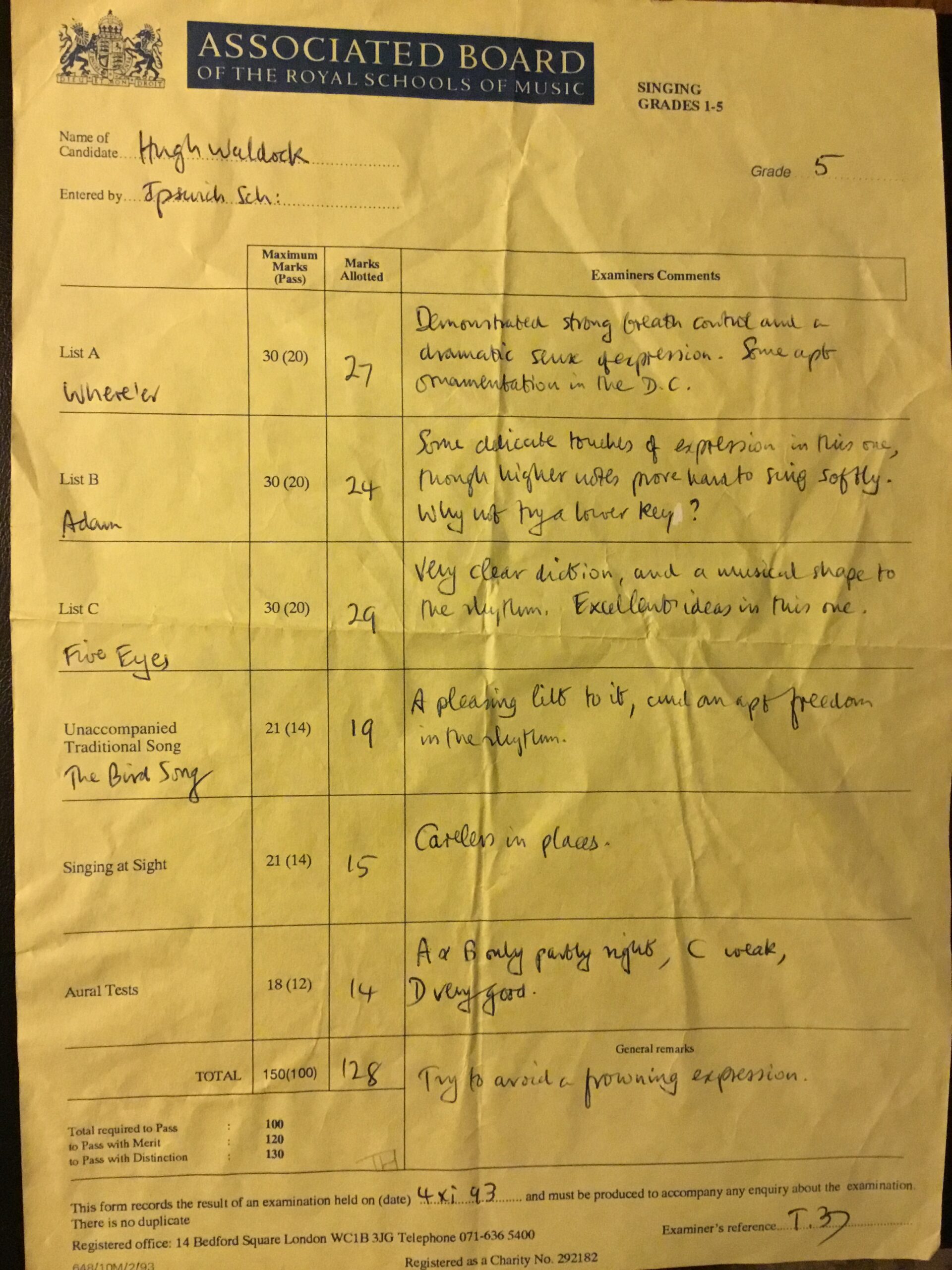
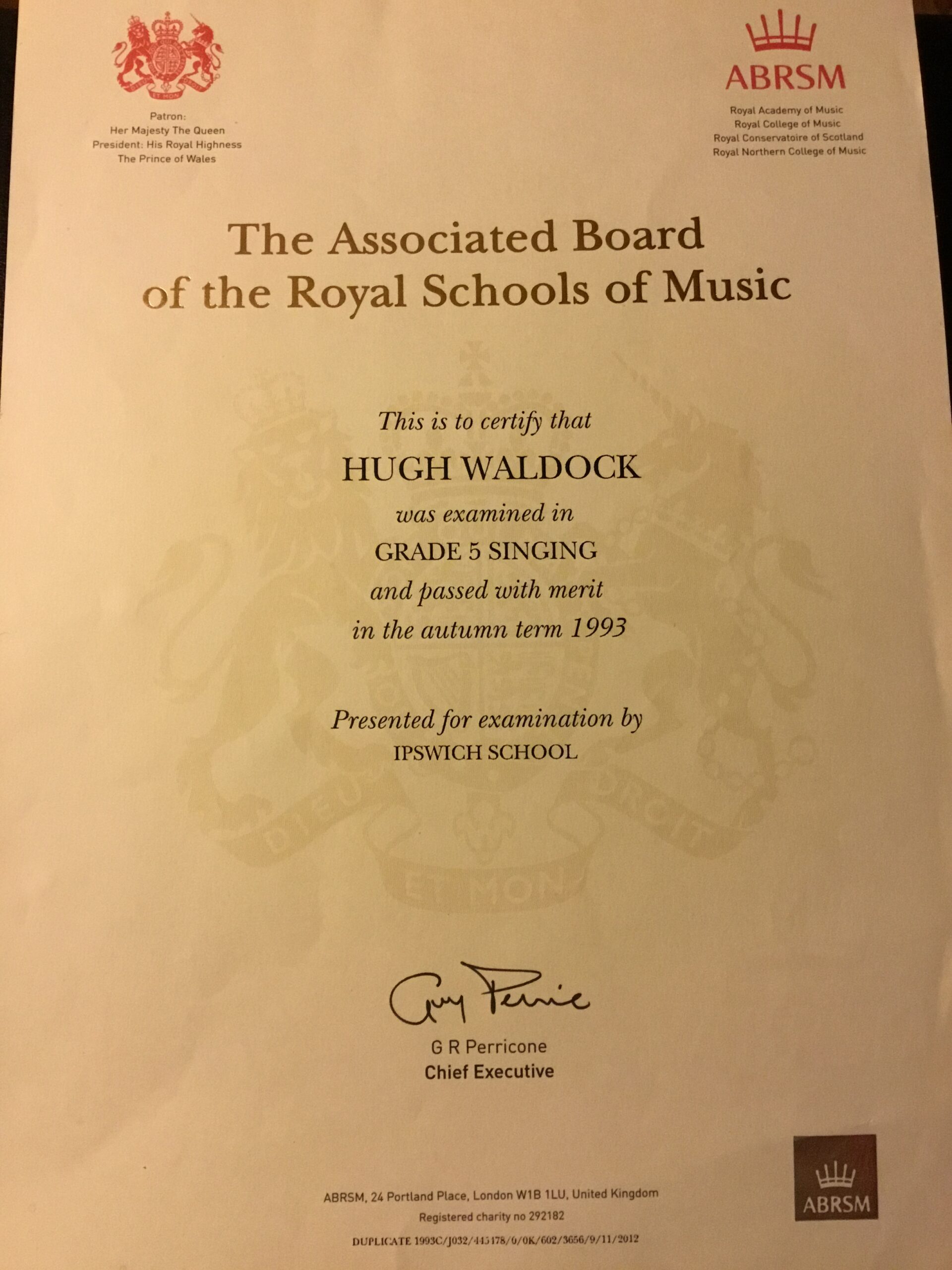
I did my Grade 8 in my year off from school with Patrick McCarthy AGSM. I sadly underperformed on the day and got 117 points whihc is a pass and 3 short of a merit, very disappointing for a school champion singer and successful auditionee for the Guildhall school of Music and drama. I've always had rotten luck with my singing. Never mind here are the marks sheet and certificate. I got it anyway that's the main thing it's a milestone and means that I'm free to do my diploma. This exam and mark are worth an extra 24 A Level points as well.
- Come Calm Content by Thomas Arne
- Du Bist Die Ruh by Franz Schubert
- Sea Fever by John Ireland
- For the Mouse is a Creature of Great Personal Valour from Benjamin Britten's Rejoice in the Lamb
Folk Song Early one Morning.


2. Theory of Music
The other field I've got the prowess of a Grade 8 exam in is Music Theory which is traditionally used for conducting and composing. I achieve Grades 6-8 on my own via self study just after completing my Masters Degree in English Language. I saw the three workbooks form Peter Aston sitting there in my cupboard unused and thought; what a waste of money if I don't actually use them! So I went through them and bought past papers and model answers and the AB guide to music theory 1+2 and used my teaching skills to set myself 3 musical exercises and 5 pages of reading every day. I passed all three of them between 2010-2013. they were also necessary for the Teaching Diploma in those days in singing but that is no longer the case.
Grade 8 in 2013.
My Grade 8 Theory I battled away at I took it twice in Colchester and narrowly failed both times and thought it might have something to do with the markers here so I sneaked off to do it in central London and passed 3rd time when I was about to give up after 13 past papers and 2 workbooks I got the result and even merited on the final 2 conducting questions. This was entirely virgin material for me and it's an A Level standard qualification I taught myself for as you cans ee from the cert. It's actually now worth a standard 8 extra A Level points. It's a good solid pass with 73 points. The pass mark is 67.
- Baroque Trio Sonatas
- Romantic Piano
- Melodic Composition
- Chamber Score Question
- Orchestral Score Question
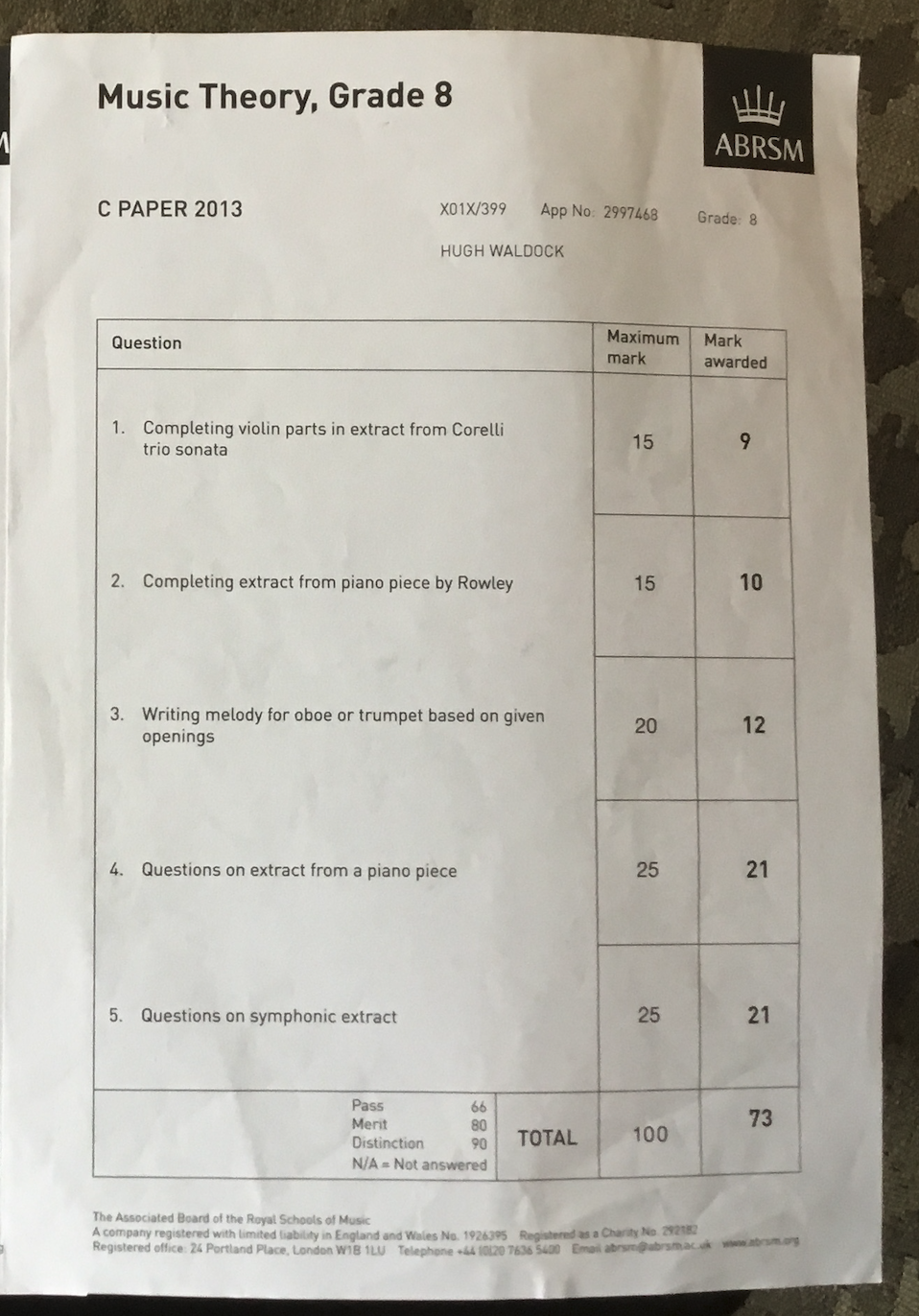
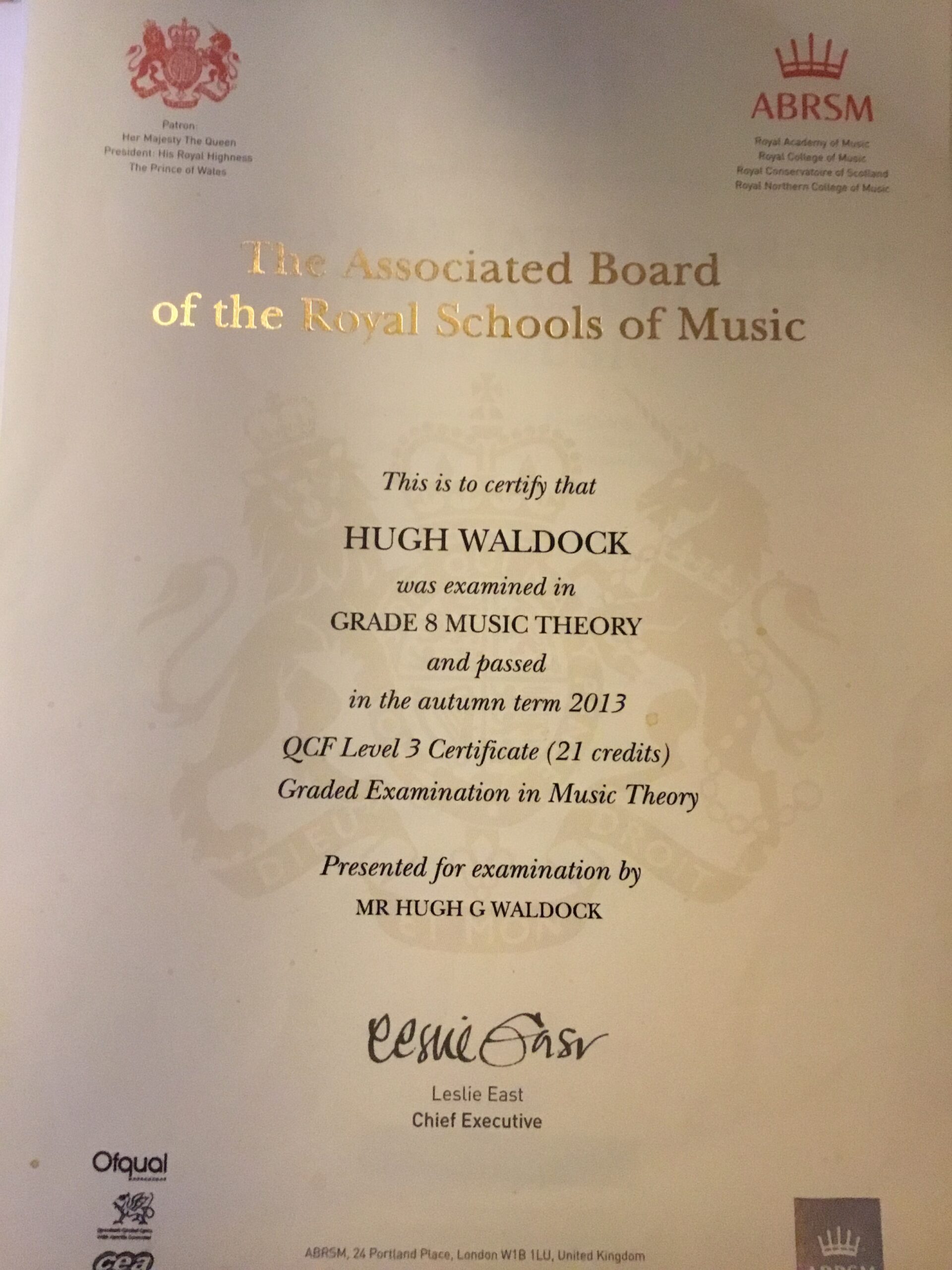
Grade 7
My Grade 7 was passed at the second attempt with exactly the same mark as my Grade 8. It's worth an extra 6 A Level points. I worked out with these upper theory grades it's essential to pass the chord analysis question and transposition question with full marks. They are worth 15% of the total marks in 2 bars and 3 words.
- Adding figures to a figured bass
- Bach Chorale Ornamentation
- Melodic Composition
- Chamber Score Question
- Orchestral Score Question
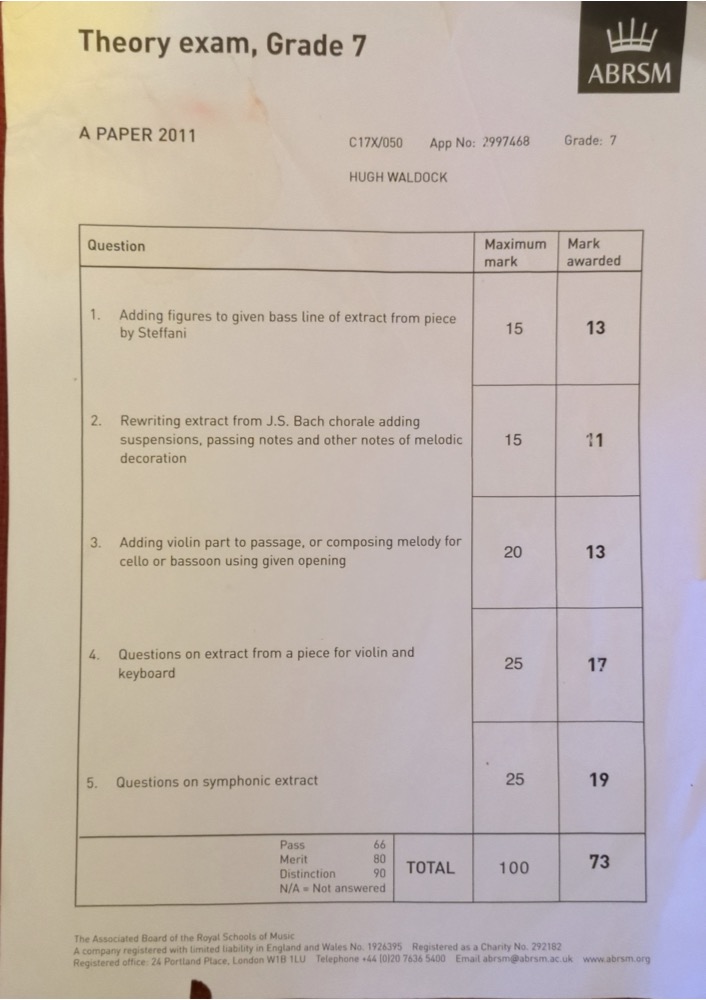
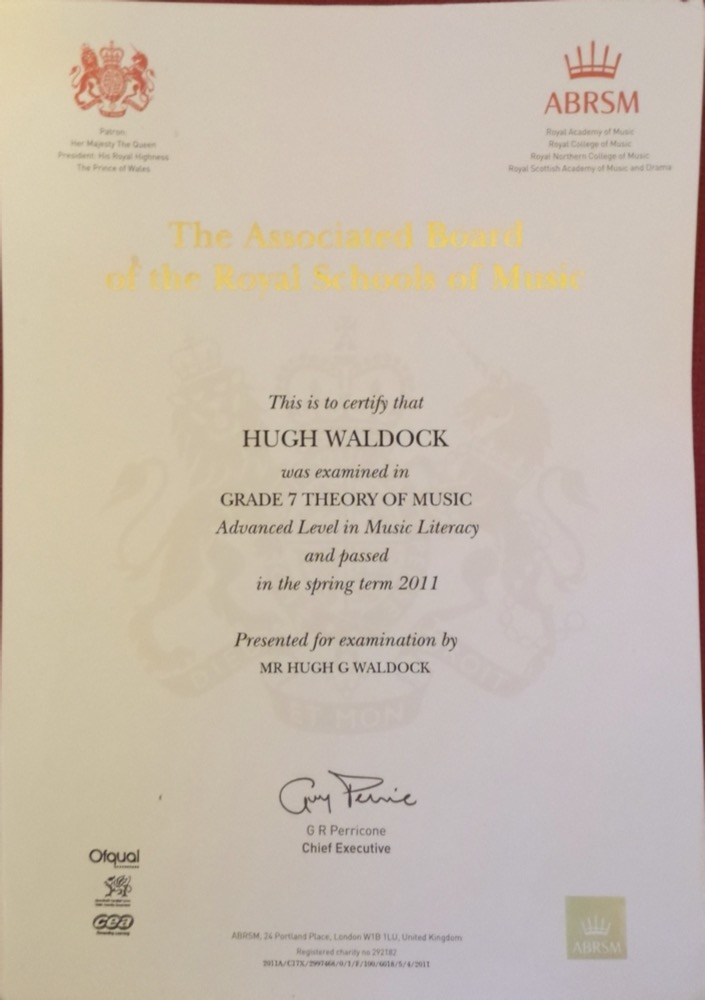
Grade 6
Grade 6 I passed first time by a fraction with 67 points. It's worth a total of 4 extra A Level points making the total for music theory 16.
- Adding a chord scheme to a piece of music
- Realising figured bass
- Melodic Composition
- Chamber Score Question
- Orchestral Score Question
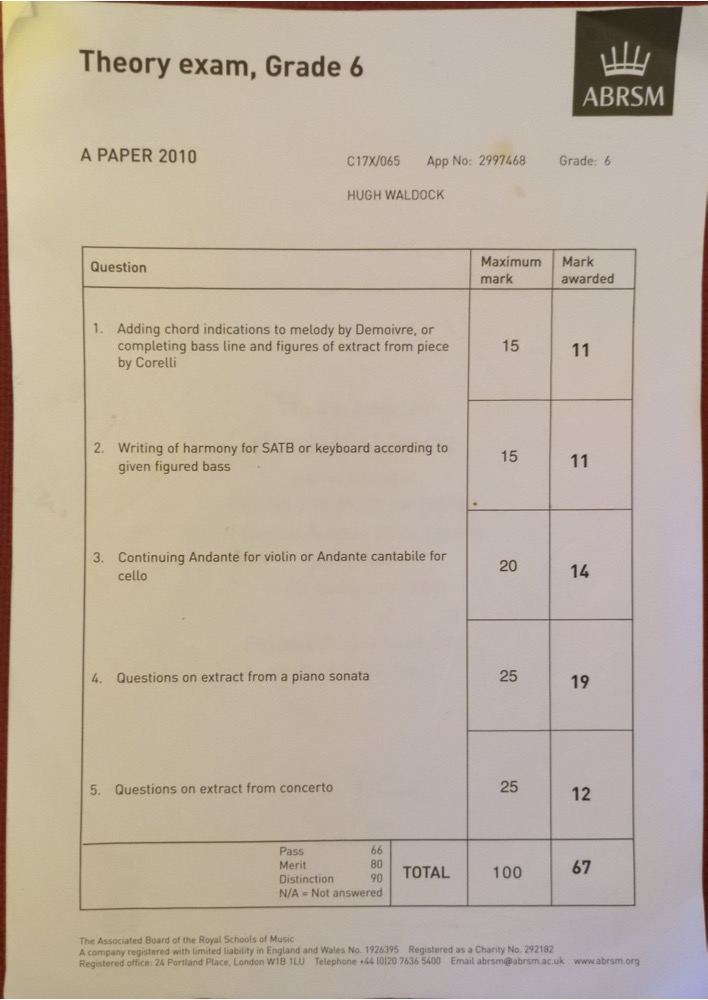
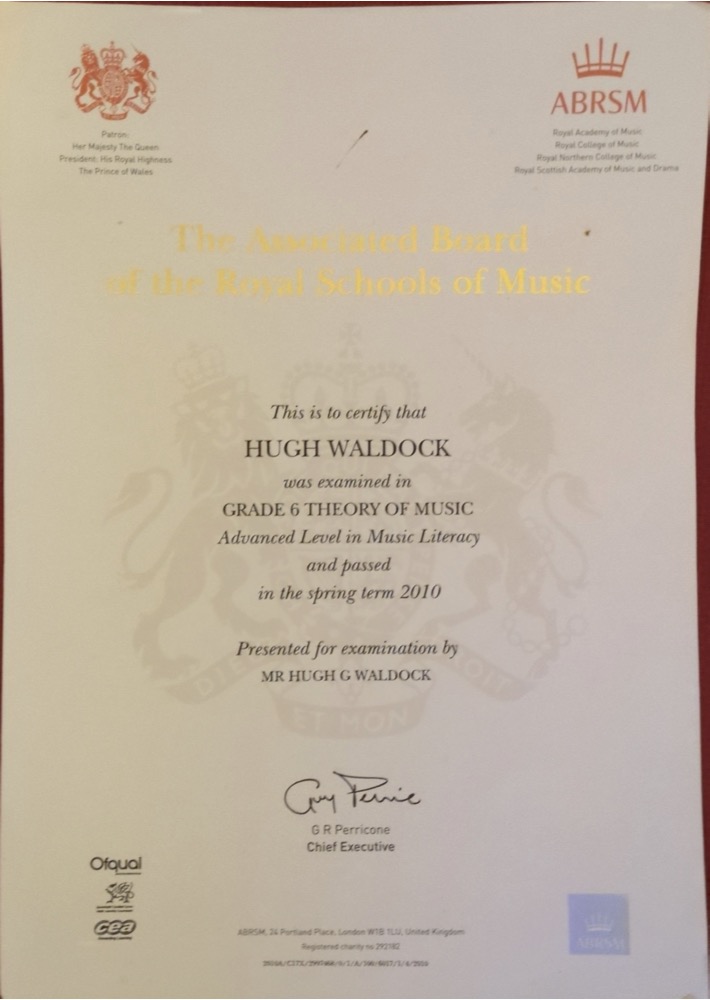
Grades 5 & 1 Music Theory. I also hold the standard Grade 5 Theory for my Grade 8 exam and also Grade on that I did with my violin teacher Katherine for which I received a distinction when I was about 13. My Grade 5 I got from our school musician in residence in 1994 Alison Daniels a Cambridge Music Graduate.
